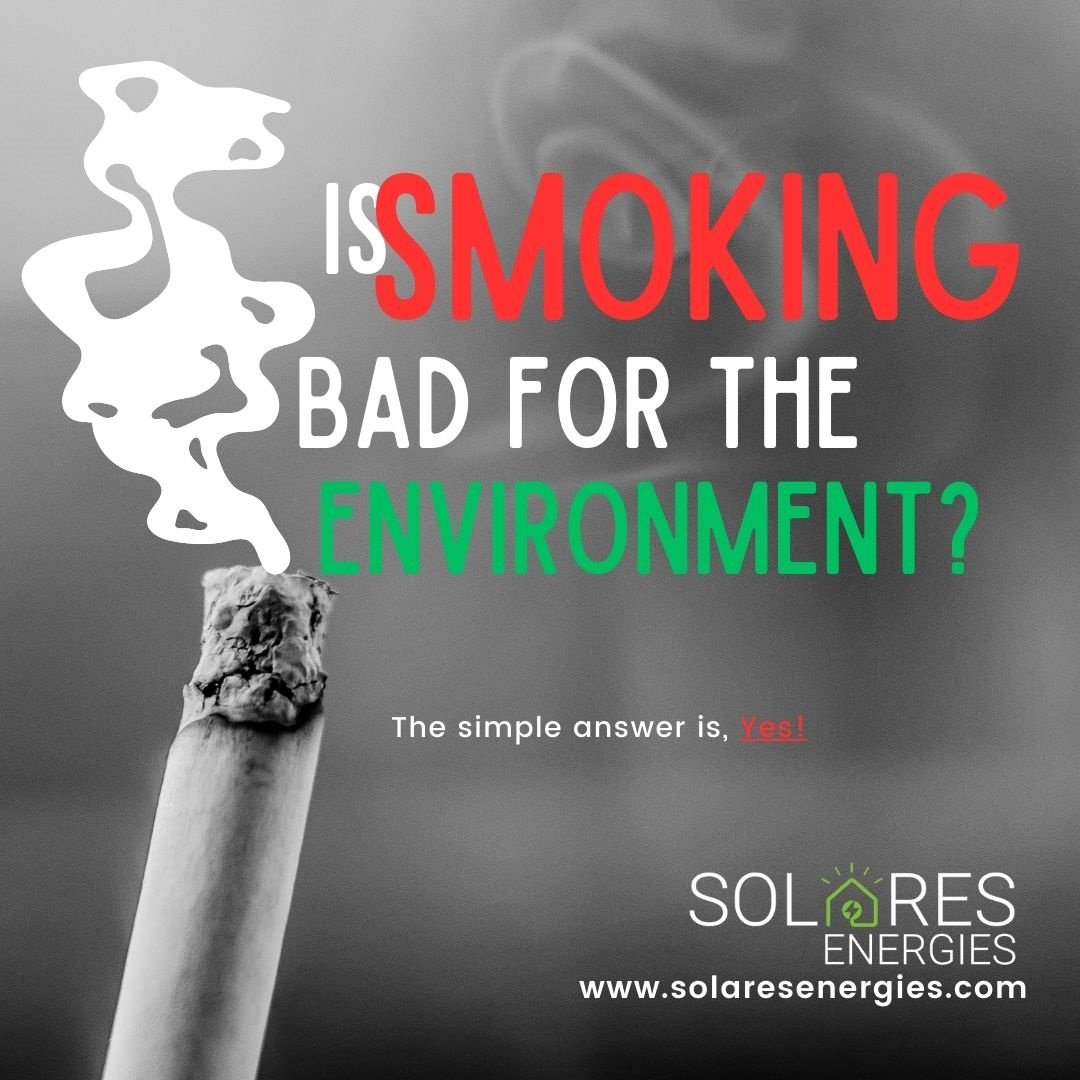The Overlooked Environmental Toll of Smoking in Spain
Insights and Actions for a Greener Tomorrow – While the health ramifications of smoking are widely acknowledged, the environmental repercussions are equally distressing yet less recognized. The lifecycle of tobacco products—from cultivation to disposal—poses a severe threat to our planet.
The Environmental Price of Tobacco
The environmental degradation from tobacco is multifaceted, affecting air, land, and water:
- Air Quality Degradation: Smoking not only compromises human health but also pollutes the air with harmful compounds.
- Deforestation Catalyst: Annually, the tobacco industry is responsible for clearing an estimated 200,000 hectares of forests, notably in less developed nations, exacerbating deforestation.
- Water Resource Drain: An astounding 22 billion tonnes of water are consumed each year by tobacco farming, as reported by the World Health Organization (WHO).
According to WHO, the tobacco sector’s environmental cost is staggering, with significant implications for human life, tree loss, land use, water utilization, and CO2 emissions.
The Production of Tobacco
 The production of tobacco has a profound impact on the environment, contributing to a range of ecological issues. Tobacco cultivation is a significant driver of deforestation, particularly in developing countries where forests and woodlands are cleared to make way for tobacco fields. This loss of forested areas results in decreased biodiversity and habitat destruction for many species.
The production of tobacco has a profound impact on the environment, contributing to a range of ecological issues. Tobacco cultivation is a significant driver of deforestation, particularly in developing countries where forests and woodlands are cleared to make way for tobacco fields. This loss of forested areas results in decreased biodiversity and habitat destruction for many species.
Moreover, tobacco farming is water-intensive, consuming an estimated 22 billion tonnes of water annually worldwide. This extensive water use exacerbates water scarcity issues in areas already vulnerable to drought. Tobacco crops also deplete soil nutrients at a much faster rate than many other crops, leading to soil degradation and erosion. The necessity for frequent crop rotation and the use of chemical fertilizers and pesticides in tobacco farming further contribute to soil and water pollution.
 Additionally, the processing and manufacturing of tobacco products involve energy-intensive procedures that increase carbon dioxide and other greenhouse gas emissions, contributing to climate change. The transportation of tobacco products adds to this carbon footprint, making the entire lifecycle of tobacco products detrimental to the environment. Addressing the environmental impact of tobacco production requires comprehensive strategies, including the promotion of sustainable agricultural practices, the reduction of tobacco consumption, and the implementation of effective environmental regulations in the tobacco industry.
Additionally, the processing and manufacturing of tobacco products involve energy-intensive procedures that increase carbon dioxide and other greenhouse gas emissions, contributing to climate change. The transportation of tobacco products adds to this carbon footprint, making the entire lifecycle of tobacco products detrimental to the environment. Addressing the environmental impact of tobacco production requires comprehensive strategies, including the promotion of sustainable agricultural practices, the reduction of tobacco consumption, and the implementation of effective environmental regulations in the tobacco industry.
Understanding Smoking and Its Impact
Smoking encompasses the inhalation of smoke from burning plant materials, predominantly tobacco, through cigarettes, cigars, pipes, and e-cigarettes. With a smoking prevalence of 18.9% in Spain in 2022, the environmental impact is substantial, driven by deforestation, pollution, and waste from cigarette butts and e-cigarette components.
The environmental impact of smoking extends across global and local landscapes, presenting unique challenges, especially in lower-income countries.
Key Environmental Concerns
- Deforestation and Soil Degradation: Tobacco farming leads to significant forest loss and soil nutrient depletion.
- Waste and Litter: Cigarette butts, predominantly plastic, account for a large fraction of global litter, introducing toxins into ecosystems.
- Greenhouse Gas Emissions: The tobacco industry significantly contributes to carbon dioxide and methane emissions, exacerbating climate change.
The Path Forward To Recycling and Sustainability
 Addressing smoking’s environmental impact involves comprehensive strategies, including public education, sustainable alternatives, and policy reforms aimed at reducing smoking rates and its environmental footprint. Efforts to recycle cigarette waste, highlight the potential for mitigating environmental harm. Yet, the biodegradability of cigarette butts remains a myth, necessitating continued education and innovation.
Addressing smoking’s environmental impact involves comprehensive strategies, including public education, sustainable alternatives, and policy reforms aimed at reducing smoking rates and its environmental footprint. Efforts to recycle cigarette waste, highlight the potential for mitigating environmental harm. Yet, the biodegradability of cigarette butts remains a myth, necessitating continued education and innovation.
As we advance our mission at Solares Energies to Green Spain one house at a time, understanding and addressing the environmental impact of smoking is essential. We advocate for awareness, sustainable practices, and collective action to mitigate this challenge.
Most Importantly Smoking is Bad For Your Health!
In addition to its harmful effects on the environment, smoking also poses a severe risk to human health. Tobacco smoke contains more than 7,000 chemicals, including at least 70 known carcinogens. This puts individuals who smoke and those around them at an increased risk for various health issues, ranging from respiratory problems to cardiovascular disease and cancer.
In Spain alone, smoking is responsible for over 50,000 deaths each year. This staggering number highlights the need for not only addressing the environmental impact of smoking but also promoting public health and reducing smoking rates.
Frequently Asked Questions
1. Is smoking bad for the environment?
Yes, smoking significantly harms the environment. Beyond its well-known health risks, smoking contributes to air pollution, deforestation, water resource depletion, and waste problems. The tobacco industry’s activities, from cultivation to disposal of products like cigarette butts and e-cigarettes, lead to substantial environmental degradation, including the emission of millions of tonnes of CO2 and other harmful chemicals into our ecosystem.
2. What is second-hand smoke?
Second-hand smoke refers to the combination of smoke from the burning end of a cigarette, cigar, or pipe, and the smoke exhaled by the smoker. This smoke contains over 7,000 chemicals, many of which are toxic and can cause cancer. Non-smokers exposed to second-hand smoke are at risk of developing serious health issues, including lung cancer, heart disease, and stroke, in addition to suffering from immediate adverse effects on their cardiovascular and respiratory health.
3. Do cigarette butts degrade over time?
Contrary to common belief, cigarette butts do not biodegrade easily. They are made from cellulose acetate, a form of plastic, which can take anywhere from 18 months to 10 years to decompose under environmental conditions. Even as they degrade, they release toxic chemicals like formaldehyde, nicotine, arsenic, and lead into the environment, contributing to pollution and harming wildlife.
4. What efforts are being made to recycle cigarette waste?
There are innovative recycling programs, that specifically address cigarette waste. These programs involve collecting cigarette butts and separating the components. The tobacco and paper are composted, while the filters, made of plastic, are processed into new plastic products. Such initiatives not only help to reduce litter but also prevent the leaching of toxic substances into the environment.
5. Can smoking alternatives reduce environmental impact?
Smoking alternatives, like electronic cigarettes (vapes) and nicotine replacement therapies, are marketed as less harmful to health compared to traditional smoking. However, their environmental impact, particularly in terms of waste and sustainability, is a growing concern. E-cigarettes, for instance, introduce batteries, plastics, and electronic waste into the environment. While they may reduce some aspects of tobacco’s environmental footprint, the overall sustainability of smoking alternatives remains a complex issue, urging the need for proper disposal and recycling methods to mitigate their environmental impact.
Taking Action for a Greener Tomorrow
Reducing tobacco consumption is crucial for protecting both human health and the environment. Governments, organizations, and individuals must take action to reduce smoking rates and promote sustainable alternatives.
Implementing stricter regulations on the tobacco industry, promoting public awareness campaigns, and supporting individuals in quitting smoking are all steps that can be taken to create a greener tomorrow. By working together, we can reduce the environmental impact of smoking and protect our planet for future generations. Let’s take action now for a healthier and more sustainable tomorrow!
Join Us in Our Green Journey
If you’re interested in Renewable Energies for The home and reducing your carbon footprint and your monthly household energy expenses, please contact the team, at Solares Energies visit www.solaresenergies.com or reach out to us at contactus@solaresenergies.com | 604 47 34 14 – See the full list of Renewable Energy Products
It is time for action. It is time to raise awareness about the environmental toll of smoking and its consequences for our planet. As individuals, we can support sustainable alternatives, educate ourselves and others, and advocate for policies that promote a greener tomorrow. Let us join hands in this journey towards a healthier and more sustainable world. Remember, every small action counts!



 Solar Panel Products & Articles
Solar Panel Products & Articles Other Products & Services
Other Products & Services



